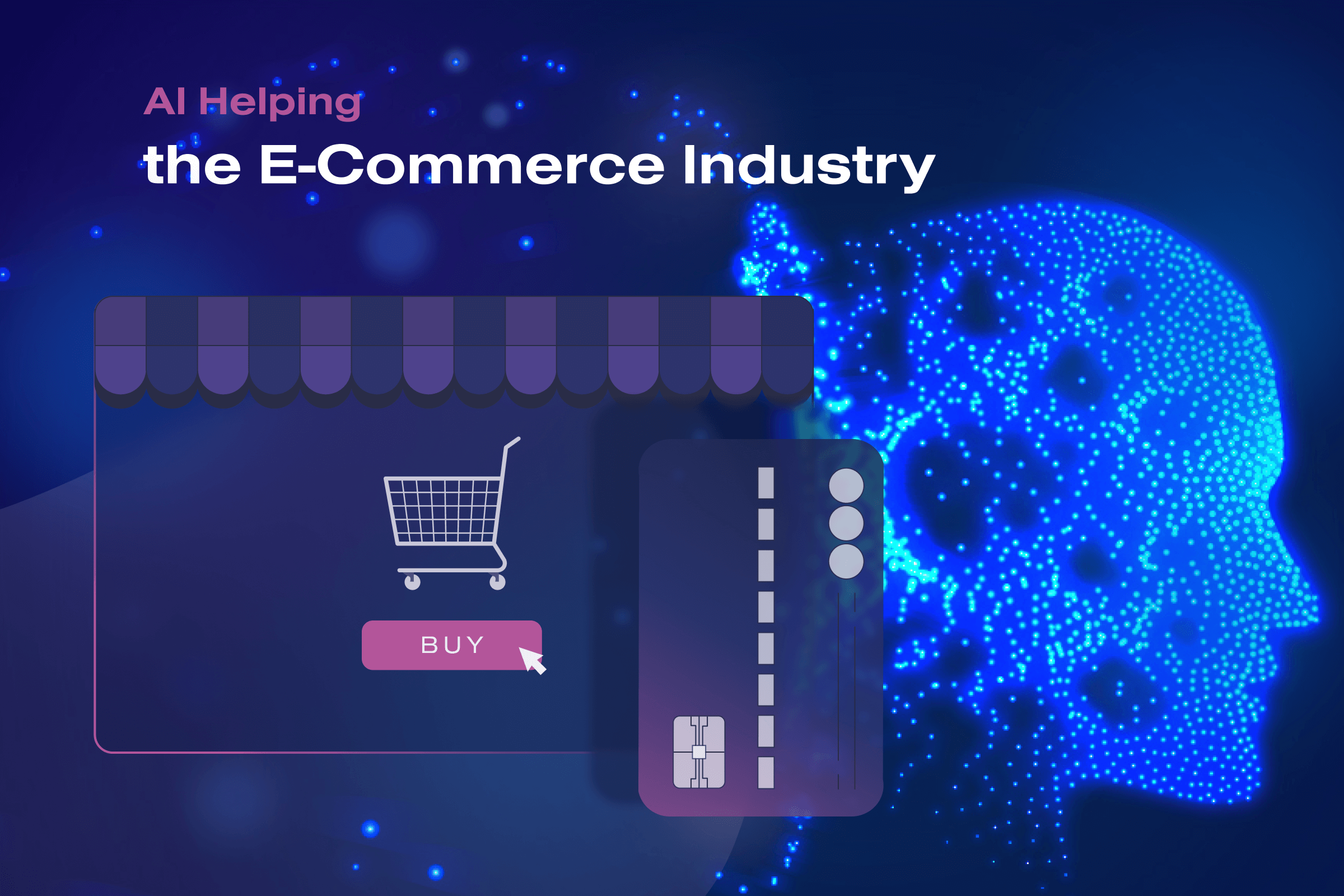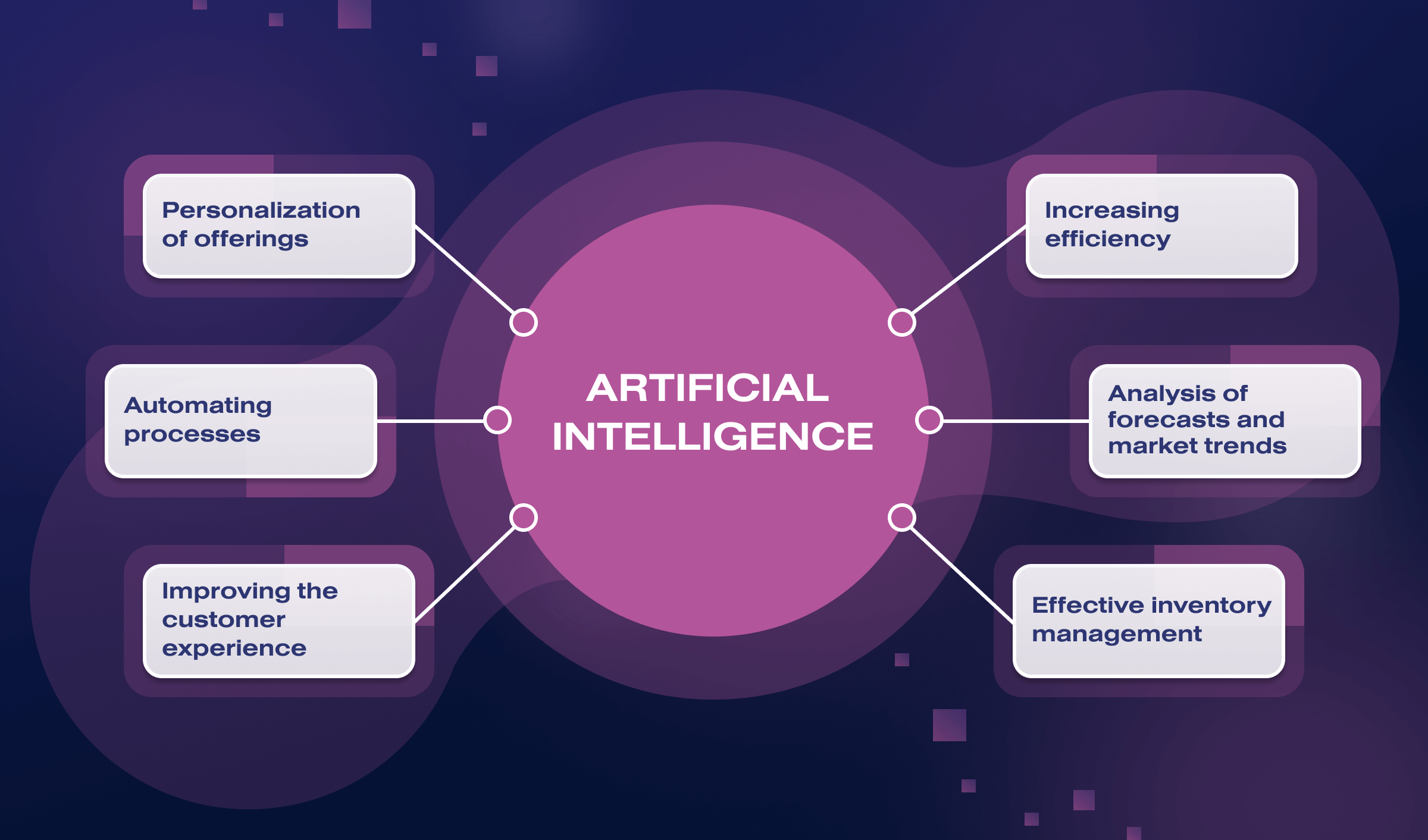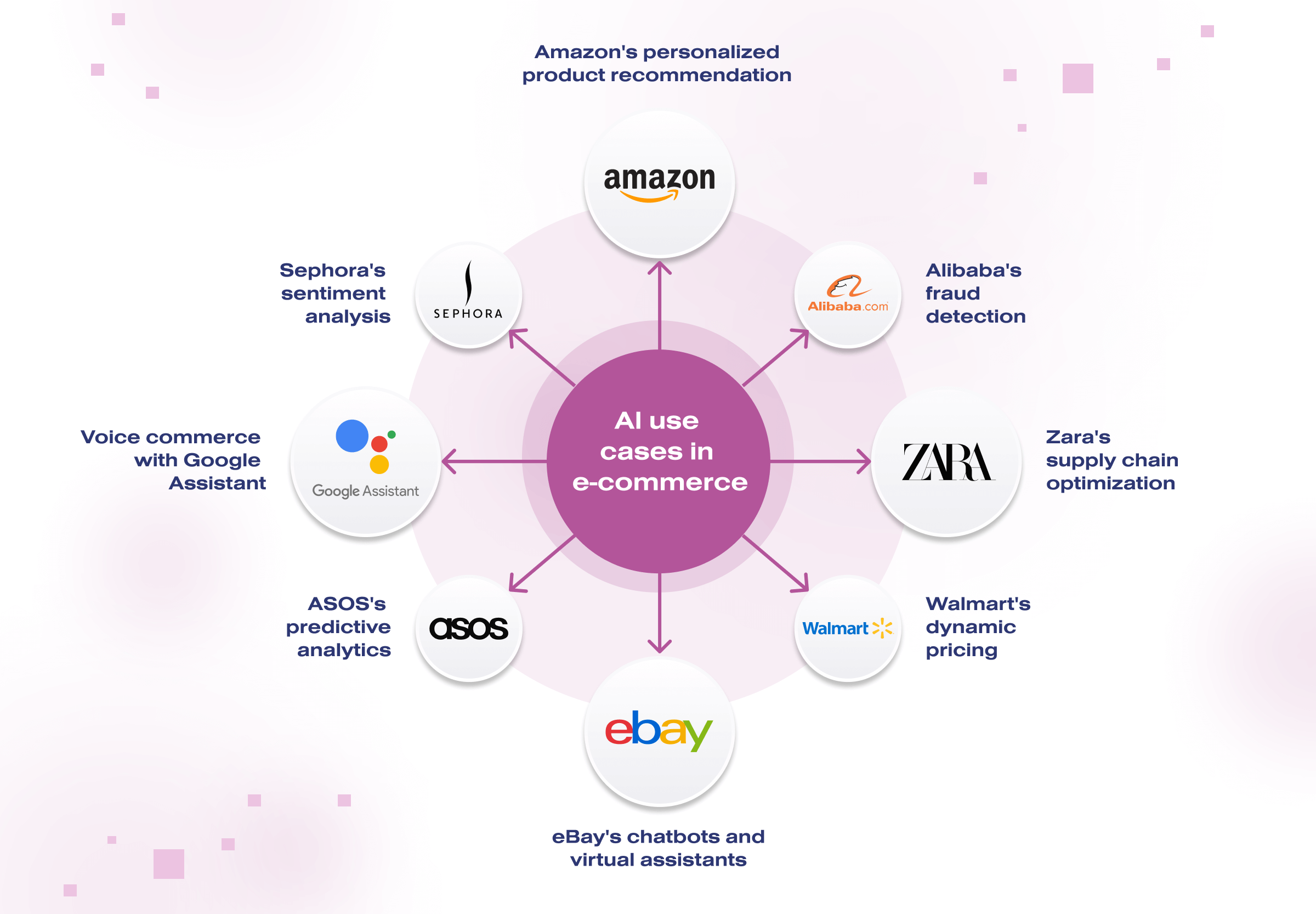In the face of increasing competition, e-commerce businesses are turning to new technologies because of increasing competition, one of which is artificial intelligence (AI). According to Artificial Intelligence Market 2020-2027 report, the artificial intelligence market is projected to grow from $387.45 billion in 2022 to $1,394.30 billion by 2029, at a CAGR of 20.1% in the forecast period. The report said the market size was valued at $328.34 billion in 2021.
This article will discuss the benefits of using AI in e-commerce, AI use cases, and how to implement artificial intelligence into your e-commerce business.
Key points
Importance of AI in the e-commerce industry

To compete today, retailers must be more responsive than ever while eliminating inefficiencies in their operations. So, retailers are increasingly using the power of artificial intelligence to collect and process vast amounts of data, simplify website monitoring, optimize customer service, adjust logistics, determine customer needs and sentiment, and make the shopping experience as enjoyable as possible. Intel:
“Digital transformation in retail is about more than connecting things. It’s about converting data into insights, which inform actions that drive better business outcomes. AI in retail—including machine learning and deep learning—are key to generating these insights. For retailers, that leads to incredible customer experiences, opportunities to grow revenue, fast innovation, and smart operations—all of which help differentiate you from your competitors.”
According to PwC, in 2021, more than 71% of leading retail brands fully or partially used AI technology in their operations.
Benefits of using Artificial Intelligence in e-commerce companies

Artificial intelligence (AI) has numerous benefits for e-commerce companies. The key benefits are:
- Personalization of offerings. Artificial intelligence allows for the analysis of customer data and shopping behavior, which enables online stores to customize their offerings to meet the individual needs and preferences of specific users. Personalization can increase engagement, average order value, and conversion rates in an online store.
- Automating processes. Using artificial intelligence, online stores can automate many processes, such as cataloging products, qualifying leads, or generating product recommendations.
- Improving the customer experience. Artificial intelligence allows better identification of customer needs, increasing shopping satisfaction and customer loyalty.
- Increasing efficiency. With the help of AI, online stores can better collect and analyze data, which allows for better business decision-making and more efficient operations.
- Analysis of forecasts and market trends. Artificial intelligence enables analysis of forecasts and market trends, allowing online stores to prepare for industry and market changes. Artificial intelligence is already used by Google Analytics 4, which predicts the demand growth for specific products in specific periods of the year.
- Effective inventory management. Manual inventory management carries a high risk of error and, consequently, failure to prepare for high demand or, on the contrary, overstocking the store in relation to real needs. Artificial intelligence tools can be used to effectively manage inventory. These, based on collected data, independently forecast the demand for a specific product, which allows you to better invest resources and ensure the desired availability of the product in any period, like peak sales.
In 2021, McKinsey & Company and the Retail Industry Leaders Association named 7 imperatives for rethinking retail. AI-informed technologies can in some way support each.
8 AI use cases in e-commerce

Here are 8 real-world examples of AI use cases in e-commerce:
- Amazon’s personalized product recommendation. Amazon uses AI algorithms to analyze customer browsing and purchase history to provide personalized product recommendations. By the way, these recommendations made Amazon successful in driving sales and customer engagement.
- eBay’s chatbots and virtual assistants. eBay uses AI-powered chatbots and virtual assistants to handle customer inquiries, provide support, and assist with order processing, improving customer service and reducing response times.
- Alibaba’s fraud detection. Alibaba uses AI algorithms to analyze transaction data and detect patterns indicative of fraud, protecting its customers and business from fraudulent activities.
- Walmart’s dynamic pricing. Walmart uses AI algorithms to analyze market data, competitor pricing, and customer behavior to dynamically adjust prices in real-time, optimizing pricing strategies for maximum profitability and competitiveness.
- Zara’s supply chain optimization. Zara uses AI to optimize its supply chain, including inventory management, demand forecasting, and production planning, to streamline operations, reduce costs, and minimize stockouts or overstocks.
- Voice commerce with Google Assistant. Google Assistant, a popular voice-activated virtual assistant, allows customers to make purchases through voice commands, providing a convenient and seamless shopping experience through voice-activated devices.
- Sephora’s sentiment analysis. Sephora uses AI-powered sentiment analysis to analyze customer reviews and social media data, gaining insights into customer feedback and preferences to inform product development and marketing strategies.
- ASOS’s predictive analytics. ASOS uses AI-powered predictive analytics to analyze customer data and forecast customer behavior, enabling them to proactively tailor marketing and retention strategies for personalized and targeted campaigns.
By 2030, AI-powered e-commerce solutions will be worth $16.8 billion. If you are an e-commerce business owner, there is no time to wait because your competitors are already taking advantage of AI.
How to implement artificial intelligence into your e-commerce business
Implementing artificial intelligence (AI) into an e-commerce business involves several steps. Here’s a general guide on how to implement AI into your e-commerce business:
- Identify business goals. Determine specific business objectives and goals that can be addressed with AI. For example, it can be improving customer personalization, optimizing pricing and inventory management, or enhancing customer service.
- Assess data availability. Evaluate the availability and quality of data that can be used to train AI algorithms. This includes customer, transaction, product, and other relevant data points. Ensure the data is clean, organized, and compliant with privacy regulations.
- Choose AI use cases. Identify the AI use cases that align with your business goals and data availability. Common AI use cases in e-commerce include personalized recommendations, chatbots, fraud detection, and demand forecasting.
- Select appropriate AI technologies. Choose the appropriate AI technologies, tools, and platforms based on your business requirements and budget. This may include machine learning, natural language processing (NLP), computer vision, and other AI technologies.
- Develop and train AI models. Develop and train AI models using relevant data. This may require hiring data scientists or working with an AI consultant like Soloway Tech. Ensure the AI models are tested, validated, and optimized for accuracy and performance.
- Integrate AI into your e-commerce platforms. Integrate the trained AI models into your e-commerce platforms. In some cases, e-commerce re-platforming is needed.
- Monitor and refine AI models. Continuously monitor and refine the AI models to ensure they deliver the desired outcomes. This may involve analyzing performance metrics, gathering customer feedback, and making necessary adjustments to improve the effectiveness of the AI models.
- Ensure data privacy and security. Implement appropriate data privacy and security measures to protect customer data and comply with relevant regulations, such as GDPR or CCPA. This includes securing data storage, handling customer data responsibly, and obtaining proper consent for data usage.
- Provide staff training. Provide training and education to your staff on how to effectively use and manage AI-powered tools and technologies. This may include training on data handling, customer interactions with AI-powered systems, and leveraging AI insights for decision-making.
- Monitor and measure results. Continuously monitor and measure the results of AI implementation in your e-commerce business. Track key performance indicators (KPIs) related to your business goals and assess the impact of AI on customer experience, sales, operational efficiencies, and other relevant metrics.
Remember that implementing AI into an e-commerce business is an ongoing process that requires continuous monitoring, refinement, and adaptation. It’s crucial to stay updated with the latest advancements in AI and e-commerce to ensure that your implementation remains effective and aligned with your business goals.
For this purpose, you need a strong AI development team with experience in e-commerce. We at Soloway Tech are those whom you are looking for. We provide a full range of e-commerce services and have many case studies with approved niche expertise. Our team can scale up quickly, while our organized processes allow us to start working on the project almost immediately.
Conclusion
Implementing artificial intelligence into e-commerce processes is not the future but the present of online sales. You should now consider using artificial intelligence tools and solutions to provide users with a personalized experience tailored to their expectations.
Artificial intelligence will help you better understand your customers and audience, increase sales and average order value, reduce redundant activities, and reduce time spent on repetitive tasks. Moreover, it will allow you to collect and analyze a large amount of data and give you deep insights into your audience’s behavior.
If you need a reliable e-commerce solutions development partner, we are ready to help you. Contact us right now to discuss your project tomorrow.




